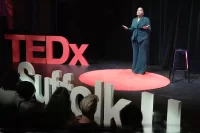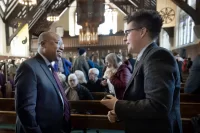
Lecture examines racial profiling during World War II, after Sept. 11
Glenn Kumekawa, a leading public-planning expert and a veteran of a World War II relocation camp for Japanese Americans, discusses the implications of the relocation camps in the post-Sept. 11 civic environment at 7:30 p.m. on Thursday, Oct. 25, in Chase Lounge, 56 Campus Ave. The public is welcome at no charge and refreshments will be provided.
A 1950 Bates graduate, Kumekawa is the director and a professor emeritus of the Intergovernmental Policy Analysis Program at the University of Rhode Island. The Current Crisis: Recalling the Internment of Japanese Americans, his talk at Bates, will consider connections between the ethnic profiling of Arab Americans following the Sept. 11 terrorist attacks and the government’s internment of 120,000 Japanese Americans following Pearl Harbor.
Issued by President Franklin D. Roosevelt in February 1942, Executive Order No. 9066 gave Japanese Americans 48 hours to dispose of any possessions they couldn’t carry and forcibly concentrated them in 10 relocation camps. Kumekawa was 14 years old when he, his parents, his brother and his sister were put behind barbed wire at a camp in Utah.
Even during the height of wartime anti-Japanese sentiment, though, many Americans were appalled by the order. Glenn Kumekawa was one of many young Japanese Americans assisted by the National Japanese American Student Relocation Council, a volunteer organization that obtained security clearances and college placements for internees. It was through that council that Kumekawa attended Bates, graduating cum laude in 1950.
After obtaining his master’s degree and doctorate from Brown University, Kumekawa entered the field of municipal planning. He was city planner for Warwick, Rhode Island, during its greatest period of growth and later rose to statewide and regional prominence as an expert in interdisciplinary planning. Among numerous achievements, Kumekawa is credited with promoting the preservation of open space and natural resources in Rhode Island and with helping the state recover economically from the closure of major military bases.
Kumekawa was profoundly affected by both the internment experience and the efforts of Americans of conscience who worked to free Japanese Americans from the camps. He sees parallels between racial attitudes in this country then, following the attack on Pearl Harbor, and now, after the terrorist attacks – with nearly a third of Americans telling a Time magazine poll that they would support interning U.S. citizens of Arab descent in camps until they were shown to be uninvolved with terrorist efforts.




